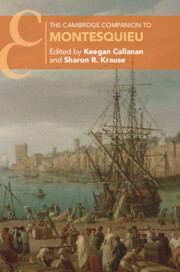(image source: Cambridge Core)
Montesquieu was among the most influential writers of the eighteenth century, and the study of his thought enriches and complicates our understanding of the Enlightenment. Following renewed interest in his writings over the last three decades, the Cambridge Companion to Montesquieu brings together the variety of disciplinary and interpretive approaches that have shaped the scholarship on his work and legacy. This Companion offers an integrated volume on Montesquieu as philosopher, novelist, historian, economic thinker, political scientist, and political theorist. It introduces readers to key themes and ongoing debates, reflects developments in the field, breaks fresh ground, indicates avenues for future research, and provides multiple perspectives on the relevance of Montesquieu's thought to contemporary problems in political theory.
Table of contents:
1. Montesquieu: life and letters by Paul A. Rahe
2. Persian letters by Catherine Volpilhac-Auger
3. Considerations on the Romans by Thomas L. Pangle
4. On the spirit of the laws by Keegan Callanan
5. Montesquieu and the classical world by Catherine Larrère
6. Montesquieu's guiding principles and foundations by Cecil Courtney
7. Virtue in Montesqueiu by David W. Carrithers
8. Internationalism, cosmopolitanism, and empires by Michael Mosher
9. Liberty in Montesquieu by Céline Spector
10. Political sovereignty in Montesquieu by Sharon R. Krause
11. Montesquieu on slavery by Vickie B. Sullivan
12. Montesquieu on the liberty of women by Diana J. Schaub
13. Political economy by Paul Cheney
14. Religion and politics by Annelien de Dijn
15. Constitutional history by Jacob T. Levy
16. Montesquieu and the enlightenment by Jonathan Israel
17. Montesquieu's liberal legacies by Rebecca E. Kingston
Bibliography.
Read more here: DOI 10.1017/9781108778923


No comments:
Post a Comment
Note: Only a member of this blog may post a comment.